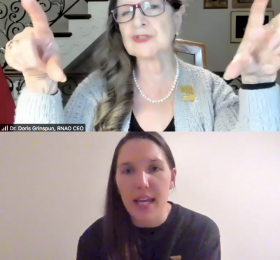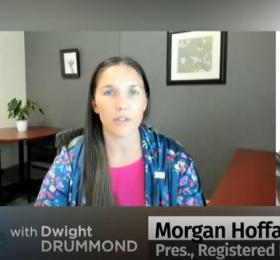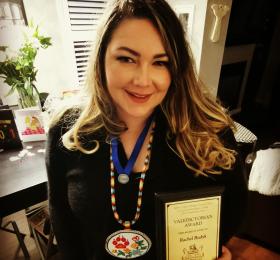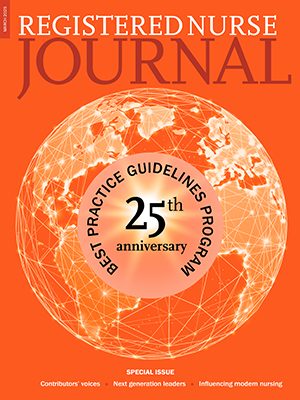Public health measures “too little, too late”
RNAO says that Premier Doug Ford should have addressed the challenges in the health system, including nursing shortages, in January 2022 by instituting added public health measures. Instead, the premier’s measures – which included halting indoor dining at restaurants as well as reducing capacity limits for restaurants and shopping malls to 50 per cent – did not address the ongoing nursing crisis. RNAO says patients will pay the price. “It is a blow to the thousands of Ontarians who are awaiting diagnostic tests, procedures and surgeries, and who will need to wait even longer with inevitable increases in morbidity and mortality,” said RNAO President Morgan Hoffarth. If the premier and chief medical officer of health had listened and acted earlier, the impact of Omicron on hospitals and other health-care settings could have been avoided, Hoffarth added. (Durham Radio News, Jan. 4)
RN quits after reaching breaking point during pandemic
RN Wendy McNeil has worked in various critical care settings for the past 40 years. On Dec. 12, the long-time RNAO member resigned from her job at Sudbury’s Health Sciences North. McNeil said this decision was a long time coming: “I could see myself, as well as my colleagues, feel like (we’re) drowning.” In an open letter on Facebook, McNeil shared that the current state of the health-care system makes her feel unable to meet the bare minimum standards of safety. She said nurses often have to redirect their focus to deal with other duties, including answering phone calls, cleaning, porter duties and navigating complex social work issues. McNeil is worried for younger nurses who are in distress and aren’t being heard. She also notes that the nursing situation was already in trouble before the pandemic: “This pandemic was just the crack that made the big crevasse. Health care has been an ongoing issue for a long, long time.” RNAO CEO Dr. Doris Grinspun responded to McNeil’s letter: “It’s a story of disregard of nursing and nursing as a profession that repeats and repeats.” (CTV Northern News, Dec. 31)
New nursing programs increase opportunity for students
St. Lawrence College is offering a new, four-year bachelor of science in nursing degree. This is part of Ontario’s recent change to allow universities and colleges to offer their own baccalaureate degrees in nursing to increase opportunities for students. The first cohort of nursing students at St. Lawrence College began in September 2021.
As part of its investment to increase enrolment in nursing education, the provincial government is providing up to $876,928 to St. Lawrence College. This investment in the nursing program will support the training of 48 practical nursing students and 48 bachelor of nursing students.
“The ability to grant our own nursing degree brings an important credential to regions where St. Lawrence College is located, and this funding will help us train more nursing professionals at a time when the need is high,” said Glenn Vollebregt, president and CEO of St. Lawrence College. The ministry of education has also approved bachelor degree programs in nursing for Humber College, Georgian College and Seneca College.
Nursing shortage has severe impact on ICU
The Omicron variant, paired with a shortage of nurses due to burnout and Bill 124 (legislation which caps wage increases for nurses at one per cent – well below inflation), has created a dire situation in Ontario hospitals. RNAO member and ICU RN Birgit Umaigba said she and her colleagues are under intense pressure. Brampton General Hospital and Brampton Civic Hospital both declared a Code Orange on Jan. 4. Umaigba explained that this code, which is generally used for disaster scenarios, is being called for a severe nursing shortage. “This is a crisis that is going to take lives. People are going to die because of a nursing shortage,” said Umaigba. Patients are not getting the quality of care they deserve because there are simply not enough nurses, she said. “We can’t have nurses working 16 hours in a row. Nurses are being guilted into working 16 hours. These are people who have to go home to their loved ones, but they’re forced to stay at the bedside.” (CBC News, Jan. 4)
Virtual Fall Tour with members
RNAO held its annual Fall Tour virtually from Nov. 15-19. CEO Dr. Doris Grinspun and President Morgan Hoffarth had the opportunity to speak with RNs, NPs and nursing students in Waterloo, Ottawa, Sarnia and Kingston. These visits allowed the pair to connect directly with members to determine next steps in advocating to government. During her visit with the Peel chapter, Grinspun heard about members’ concerns with Bill 124. There were also discussions around the staffing shortages members are seeing in their workplaces. Grinspun says these staffing shortages are a calamity. “The health-care system is on the verge of collapsing completely,” she said. (Brampton Guardian, Nov. 19). Hoffarth met with members in Sarnia who also raised concerns about Bill 124. These visits are important to remind members of the power of RNAO in making change, said Hoffarth. “(RNAO has) a lot of members and when we all speak out in a focused way, I really, truly believe we have the power to make a significant difference for nursing and health in Ontario,” she said. (Sarnia Observer, Nov. 18)
Telehealth for trans community
Throughout the pandemic, telemedicine and virtual visits have become common ways for members of the transgender and non-binary community to access primary care services, including gender-affirming hormone therapy. RN Robyn Hodgson, a trans woman, runs the InterCommunity Health Centre’s Transcare clinic in London, Ontario. She agreed that virtual transgender care is clinically appropriate and can have some valid applications, but noted there are circumstances where in-person care is required. This is particularly true for post-surgical assessments, she said. Telemedicine can play a role in these assessments, but should not replace them. “I’ve had patients send me photographs of their surgical sites…which can help when they have questions or concerns and (can aid in determining) whether an in-person visit is warranted,” said Hodgson. (Healthy Debate, Nov. 1)
Nursing student creates website to track COVID-19 rapid tests
RNAO member and Western University nursing student Elliott Hegel, in partnership with a friend who studies computer science at Carleton University, has developed a website that allows Ontarians to record their COVID-19 rapid test results. Rapid Report Ontario was developed after the province’s chief medical officer of health announced limits on PCR testing on Dec. 30, 2021.
“We need to have an understanding of where COVID-19 is in Ontario and who has (it),” Hegel told CBC News. The website allows users to input their test result and provides them with the option to include additional data such as postal code, symptoms and vaccination status. The goal of the website is to provide this data to epidemiologists, statisticians and other health researchers.
Aggressive rallies spark outrage, condemnation
RNAO spoke out against a series of disruptive protests that took place outside health organizations in September. “To block people from accessing the emergency care they need, and their regular follow-up care, is unconscionable and we need this to stop now,” President Morgan Hoffarth tells CBC Toronto News (Sept. 13). In statements released Sept 12 and Sept. 7, RNAO called for safe zones around hospitals and other health settings, and urged that charges must be vigorously pursued against those who attack health workers, engage in acts of violence, or express hate. After hearing that RNAO and Ontario NDP Leader Andrea Horwath were pushing for safe zones through legislation, ER nurse Vikky Leung, who is communications officer for the association’s new Indigenous Nurses and Allies Interest Group, launched an online petition to support the effort. “As soon as I heard there was this push…I thought to myself: what can I do to help?” she tells CP24 during a panel discussion (Sept. 13). “I’m really grateful and pleasantly surprised by the support that I’m gaining.” On the impact of these protests for those going in and out of hospitals, Leung added: “Having to see these people as you go into work or maybe when leaving after your 12- or 13-hour shift…it’s disheartening and hard to digest. I’ve been hearing from my colleagues that they’re frustrated…they’re sad.” Emergency and ICU RN Birgit Umaigba also spoke on the CP24 panel, noting: “I really do believe there is a line and people need to respect that. People should take their concerns to decision-makers as opposed to going to Toronto General Hospital…go to Queen’s Park, where these decisions are being made and leave health-care workers alone. Leave patients alone.”
RNAO introduces two new interest groups that will enrich diversity, inclusivity
Indigenous Nurses and Allies Interest Group (INAIG)
RNAO is proud to announce the Indigenous Nurses and Allies Interest Group (INAIG) for Indigenous nurses, nurses caring for Indigenous patients, and nurses who strive to educate others on issues for Indigenous clients and health providers. It aims to foster and advocate for nursing practice that follows the calls to action of the Truth and Reconciliation Commission of Canada. Rachel Radyk, INAIG’s chair, says she pushed for the interest group after noticing the lack of education about Indigenous health and Indigenous representation in nursing. “The group will help lay a foundation for nurses interested in allyship and provide a space for Indigenous nurses to connect with their culture and each other,” says Radyk. For a limited time, RNAO members can join INAIG for free. Learn more on the INAIG website.
Black Nurses Leading Change (BNLC)
RNAO’s board of directors also proudly accepted the application of the Black Nurses Leading Change (BNLC) (working title). This group, co-chaired by Daria Adèle Jüudi-Hope and Dania Versailles, emanates from the work of RNAO’s Black Nurses Task Force. BNLC will advocate for anti-racism, offer mentorship and provide continuing education. It will be a safe space for Black nurses and nursing students, and allies to network and interact. BNLC’s mission is to tackle anti-Black racism in the nursing profession and advocate for the professional advancement of Black nurses. RNAO members can join the interest group for free here until Oct. 31, 2021.
RNAO President Morgan Hoffarth says the two new interest groups are long overdue and the board of directors is delighted to have these groups to represent Indigenous nurses and Black nurses. “It is incredibly important that all nurses see themselves represented by RNAO and our 30-plus interest groups,” Hoffarth says. “Adding INAIG and BNLC will build on the diligent work RNAO has been doing on Indigenous issues and Black nurses’ issues. On behalf of the board, I am thrilled to welcome both groups. We are looking forward to both supporting them and learning from them.”
RNAO welcomes steps to implement vaccine certificates
Ontario announced on Sept. 1 that, beginning Sept. 22, people must show proof they have received both COVID-19 vaccinations before they can enter high-risk indoor public settings such as bars, casinos, gyms, theatres and indoor dining at restaurants. RNAO welcomed the plan as a necessary “first step” to transition out of the pandemic, but noted there is more action needed. CEO Dr. Doris Grinspun says: “We welcome the announcement. We welcome all that is in it and we will continue to ask for more.” (The London Free Press, Sept. 2). “We need a consistent approach and we don’t have it,” Grinspun adds of other required precautions in light of the dangerous Delta variant. RNAO’s board of directors passed a unanimous motion on the need to do more, which was immediately followed by a media release on Aug. 5 calling on the Ontario and federal governments to enact vaccine passports to keep people safe as they enjoy non-essential activities. “Having a secure passport will allow people who have received both doses of the vaccine to enjoy the things that they have been missing out on for the past 17 months,” says RNAO President Morgan Hoffarth. “We are facing dangerous variants and a fourth wave driven by those who aren’t vaccinated; a vaccine passport helps address that.” (680 News, Aug. 7). Read RNAO’s response to the Sept. 1 announcement, and find out more about ongoing advocacy by visiting Grinspun’s COVID-19 blog for regular updates.




